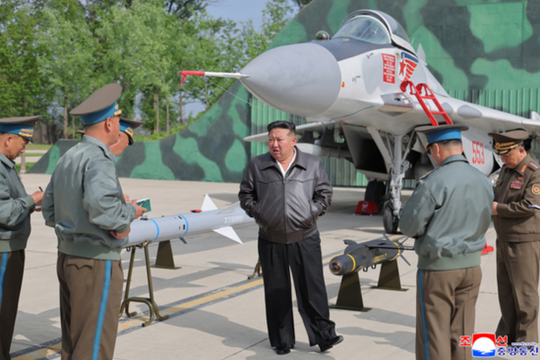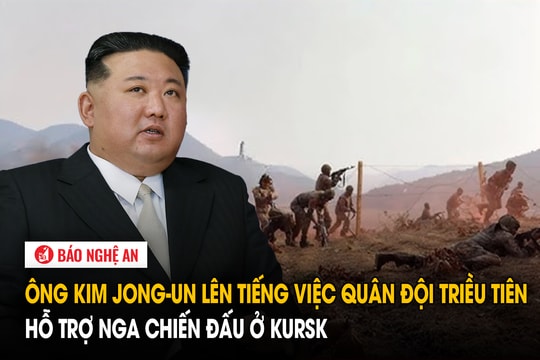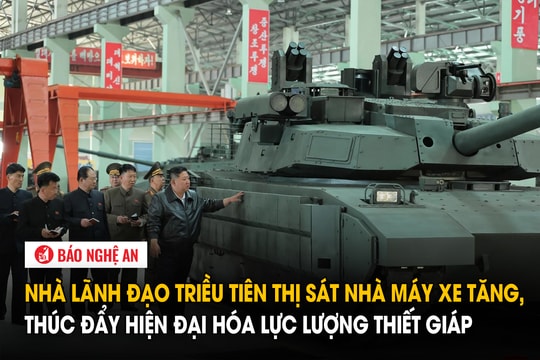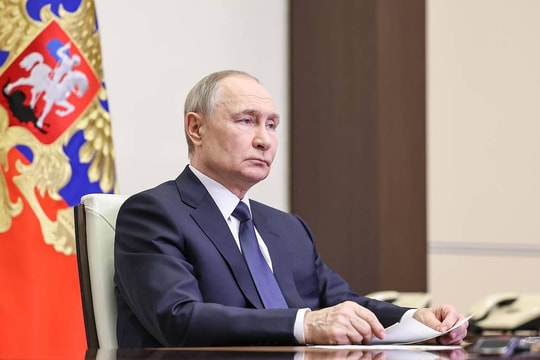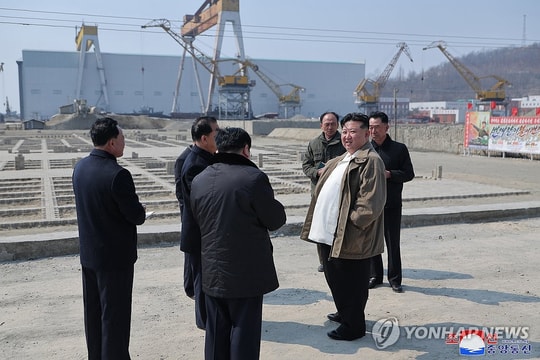Will Kim Jong-un be the “Deng Xiaoping of North Korea”?
From simultaneously building nuclear deterrence and developing the country, Pyongyang now claims to want to focus entirely on rebuilding the economy. Is Mr. Kim trying to be "North Korea's Deng Xiaoping"?
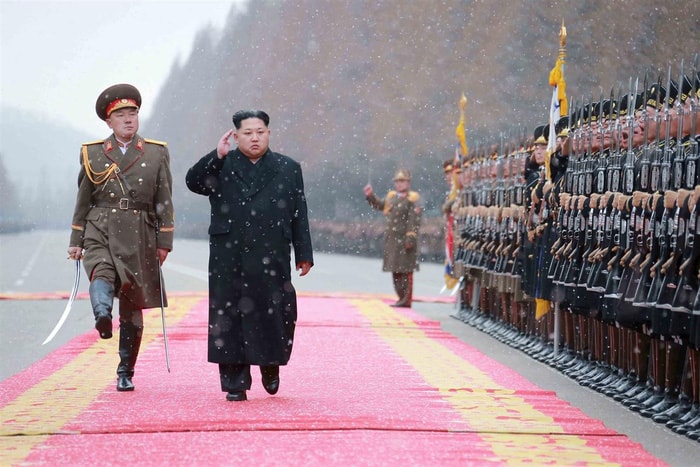 |
| Photo released on January 10, 2016 shows North Korean leader Kim Jong-un visiting the Ministry of the Korean People's Armed Forces on the occasion of the New Year. Photo: REUTERS |
Since taking over as leader of North Korea, Kim Jong-un has called for pursuing parallel development of nuclear weapons and the economy with the aim of building North Korea into a "great socialist nuclear power".
However, on April 21, Mr. Kim suddenly moved to stop his signature policy, which was known as "Byungjin" or "parallel development."
"Great victory" amid doubts
The strategy has been at the heart of North Korea's development plans under Kim Jong-un, who has now declared it is time to embrace a "new strategic path" and focus the country's resources on rebuilding the economy.
As for the nuclear weapons in storage, Mr. Kim essentially declared that the capability was complete and that North Korea now had no need to conduct any more missile or nuclear tests, and would close its only nuclear test site, Punggye-ri.
North Korean leader Kim Jong Un said the "Byungjin" policy had achieved a "great victory" and the country's arsenal was now capable of deterring hostile forces.
South Korean experts say Kim is showing a willingness to dismantle his nuclear arsenal in exchange for other benefits, such as economic aid, a peace treaty with Seoul and security guarantees from the US. These will be necessary factors for North Korea to rebuild its economy.
The US, South Korea, China and Japan have all welcomed the move, but remain skeptical as it is just one of many steps towards complete denuclearisation of the Korean peninsula. North Korea has not mentioned any further steps beyond the promise.
Lee Sung Yoon, a North Korea expert at Tufts University in the US, said Kim's decision was a repeat of an old North Korean tactic: trying to "create a smokescreen" to gain concessions from hostile forces, but then not really giving up nuclear weapons.
US officials say they have been repeatedly deceived by North Korea in previous denuclearization talks. A 1994 deal collapsed when the US accused North Korea of secretly enriching uranium. Another in 2005 fell apart after a dispute over how to verify a complete nuclear freeze. And in 2012, North Korea launched a long-range missile after pledging to stop testing.
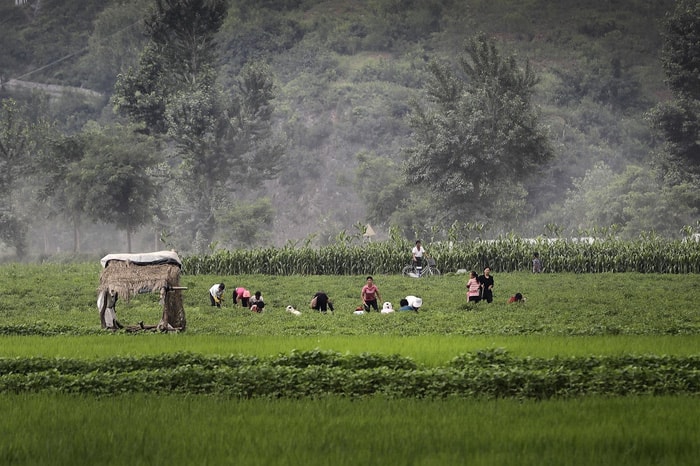 |
| Farmers work in the fields in Sangwon, North Korea in 2017. Kim Jong-un once declared that he would not let his people "tighten their belts again". Photo: AFP |
Will the opportunity to be "Deng Xiaoping" come?
Under the "Byungjin" policy, Kim Jong-un accelerated the nuclear and intercontinental ballistic missile programs. Late last year, he declared the completion of the "national nuclear force." At that time, the North Korean leader also carried out market-oriented reforms and launched large-scale construction projects in the capital, Pyongyang.
According to the newspaperNew York TimesMr. Kim has also announced plans to open special economic zones, which he hopes will attract foreign investors. However, this dream can only be achieved if international sanctions against North Korea are lifted.
"Kim Jong-un is looking for rapid economic development like he saw in China. The North Korea he envisions is very different from the North Korea his father (Kim Jong Il) saw," said Lee Jong-seok, a former official working at the South Korean Unification Ministry.
The expert believes that Kim Jong-un would be willing to give up nuclear weapons in exchange for economic development. He said: "We only look at the nuclear aspect of Kim Jong-un's regime, without trying to look at the other aspects. If he is only satisfied with providing his people with three meals a day, he will not give up nuclear weapons!"
The late North Korean leader Kim Jong Il, father of Kim Jong-un, ruled the country with a policy of "Songun", or "Military First". Accordingly, Pyongyang focused resources on military development, giving privileges to high-ranking generals to export minerals and seafood.
The military stood loyally behind Kim Jong Il as he led the country through a famine in the 1990s that claimed the lives of more than 2 million people.
In 2012, in his first public speech as North Korean leader, Kim Jong-un said he would not let his people “tighten their belts again.” The admission of failure from a member of the ruling Kim family was seen as a surprising move.
In 2013, the Workers' Party of Korea adopted the "Byungjin" policy. They asserted that the country's economic development would only take place if the country's security was guaranteed.
At a party congress in 2016, Mr. Kim said that “Byungjin” was not a temporary move, but a permanent strategy. At another party congress in October 2017, Mr. Kim said that North Korea was “absolutely correct” in pursuing the “Byungjin” policy.
North Korea's true motives remain uncertain. Some analysts believe that Kim's desperate "hunger" in the face of international sanctions has led him to back down, and that he may have only temporarily halted his nuclear program in exchange for concessions.
However, Mr. Cheong Seong Chang - a senior expert at the Sejong Institute in South Korea - commented that in the short term, Mr. Kim's statement will further meet "the expectations of the North Korean people for economic improvement."
If Mr Kim is serious about economic development, he will need the world’s help. Experts say North Korea is facing a similar situation to China during the Deng Xiaoping era in the 1980s, when opening up to the West provided a huge opportunity for China’s rapid economic growth.
"Whether Kim Jong-un will become North Korea's Deng Xiaoping will depend on whether the international community, including the US and South Korea, can provide security guarantees and development opportunities for North Korea to denuclearize," Cheong said.
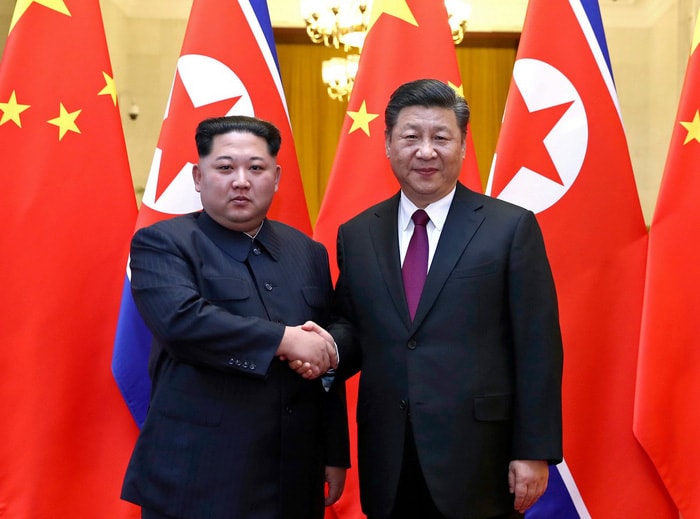 |
| North Korean leader Kim Jong-un (left) shakes hands with Chinese President Xi Jinping during his visit to China in late March. Photo: Reuters |
Deng Xiaoping is known as the one who launched the "reform and opening up" plan and this policy was officially approved by the 3rd Central Conference, 11th term in November 1978.
Deng Xiaoping's policy placed special emphasis on opening up, particularly towards Western countries. It marked a significant change and rapid development of the Chinese economy in the following 30 years.

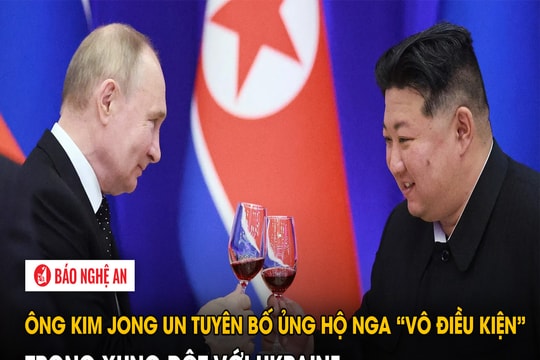
.jpg)
